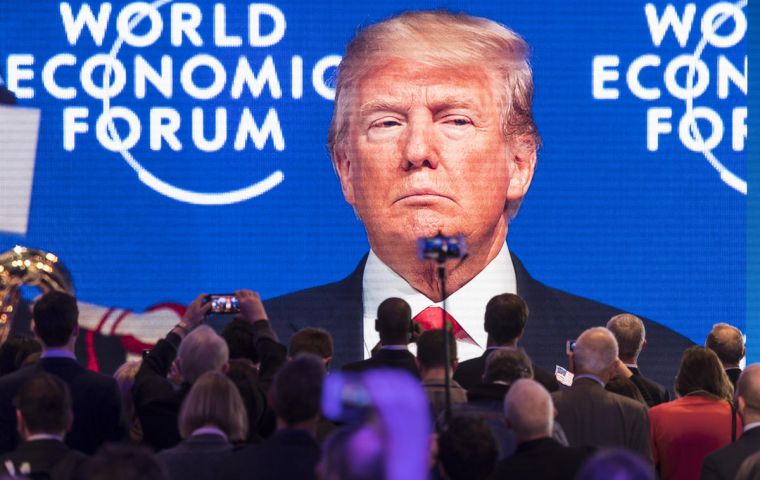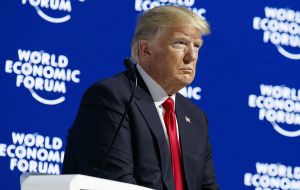MercoPress. South Atlantic News Agency
Trump tells Davos forum “America First”, but it does not mean America alone
 “There has never been a better time to hire, to build, to invest and to grow in the United States, America is open for business and we are competitive once again.”
“There has never been a better time to hire, to build, to invest and to grow in the United States, America is open for business and we are competitive once again.”  Trump spent much of his speech outlining the economic highlights of his presidency and selling its strengths to the gathered business and finance leaders.
Trump spent much of his speech outlining the economic highlights of his presidency and selling its strengths to the gathered business and finance leaders. President Trump declared America “open for business” in a speech on Friday to global to political and business elites in Davos, Switzerland, while taking a hard line on trade and vowing to make commerce with other countries “fair and reciprocal.”
“There has never been a better time to hire, to build, to invest and to grow in the United States,” he said. “America is open for business and we are competitive once again.”
Trump spent much of his speech outlining the economic highlights of his presidency and selling its strengths to the gathered business and finance leaders.
“After years of stagnation, the United States is once again experiencing strong economic growth. The stock market is smashing one record after another and has added more than US$7 trillion in new wealth since my election,” he said. “Consumer, business and manufacturing confidence are the highest they’ve been in many decades.”
Trump slammed regulation (which he called “stealth taxation”) and touted his administration’s deregulation and tax cuts to make America more hospitable to business.
“Now is the perfect time to bring your business, your jobs, your investments back to the United States,” he said. However, while citing the strength of free market deregulation and tax cuts, he also warned that he wanted international trade not just to be free, but fair.
“We will enforce our trade laws and restore integrity to the trading system,” he said. “Only by insisting on fair and reciprocal trade can we create a system that works not just for the United States but for all nations.”
He promised that the U.S. would “no longer turn a blind eye” to unfair trade practices from other countries, such as intellectual property theft and other predatory behaviors that he said distort the markets and hurt workers in America.
“As president of the United States, I will always put America first just like the leaders of other countries should put their country first also,” he said. “But 'America First' does not mean America alone.”
While the speech had a heavy emphasis on economics and finance, that “America First” message was similar to the message he delivered to the United Nations General Assembly in September, where he told gathered world leaders that they too should put their own country’s first in the way he had promised to do with the United States.
The speech occasionally dipped away from trade, with Trump hailing the defeat of ISIS in the Middle East while also promising to reform America's immigration laws to move away from so-called “chain migration” to a merit-based system.
In a question and answer session after the speech, Trump also couldn't resist taking a jab at the press, telling founder Klaus Schwab: “It wasn't until I became a politician that I realized how nasty, how mean, how vicious, and how fake the press can be.”
In his speech he did not mention specific trade deals, but in an interview Thursday evening, he indicated he was possibly open to the U.S. entering the Trans-Pacific Partnership, but only if it was a “substantially better deal.”
“I would do TPP if we were able to make a substantially better deal. The deal was terrible, the way it was structured was terrible. If we did a substantially better deal, I would be open to TPP,” he told CNBC.
In the same interview, he said he may or may not pull the U.S. out of the North American Free Trade Agreement -- an agreement he has repeatedly called to be renegotiated. “NAFTA's a horrible deal, we're renegotiating it,” he said. “I may terminate NAFTA, I may not — we'll see what happens”.
Earlier this week, the Trump administration announced a new tax on imported solar panels and washing machines as part of his promise to protect American jobs from foreign competition.




Top Comments
Disclaimer & comment rules-

-

-

Read all comments@PE
Jan 28th, 2018 - 10:05 pm +2Try saying 100 years next time...
Look, if you want to have a serious discussion, then you need to look at history. Europe has been at war on and off for over 2000 years. Empires have risen and fallen, countries have formed and been swallowed up, or partitioned, or freed themselves. It was kill or be killed. Alliances were mostly for expedience, and changed as soon as the balance of power changed. None of the countries were nice and they didn't care about your 'rights of everyone to the planet earth'. The Pope divided the whole world between Spain and Portugal, as if it wasn't already owned by the people living there. That is the environment where Britain was formed, and France and Spain too.
Argentina was different. Its main issues were border disputes with neighbours and federalism vs unitarianism, and it fought several wars over those things. But it was never really at risk of being conquered by its neighbours. Plus by the time Argentina declared independence, the Enlightenment had happened and there were all these new ideas about rights and democracy, so it became a republic. And unlike the US, it never became strong enough to think of joining the scramble for colonies and becoming a major power. It could only have a local influence.
@PE
Jan 28th, 2018 - 05:54 pm +1Don't go overboard ....I liked the report but don't use it to expose your 'not-so-moderate' personal views...no country has a perfect record when you look at history, events need to be taken in context, not out of it, and many times it's what happened before is what determines what happens later, even if 50 years apart.
I can't believe you're just totally denying the existence of the War of the Triple Alliance, where Argentina and Brazil ganged up on their much smaller neighbour and killed approximately 50% of the entire population of Paraguay, not to mention taking half its pre-war territory.
Jan 28th, 2018 - 07:53 pm +1We'd have a much richer discussion if your comments were based in reality, Patrick.
Commenting for this story is now closed.
If you have a Facebook account, become a fan and comment on our Facebook Page!